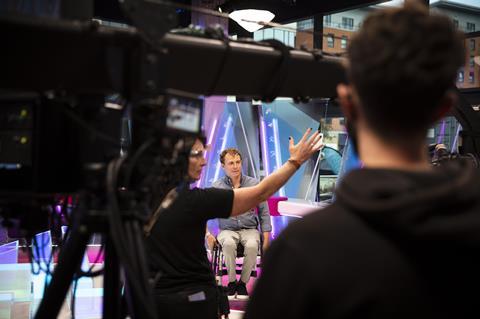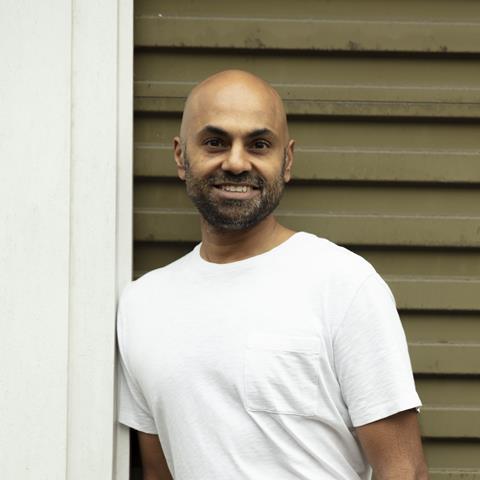Whisper CEO Sunil Patel on why the industry still has a long way to go on diversity and inclusion

Forgive the gratuitous James Bond pun, and perhaps that character is not the best popular culture reference to make my point. But, according to some media reports the future of His Majesty’s most famous spy franchise is about to undergo as much change and challenge as the continued adherence to, and progress of, diversity equity and inclusion (DEI).
To read the shocking headlines coming out of some quarters of the US last week was depressing to someone who has championed representation at every stage of my career and view it as a fundamental and foundational part of Whisper’s, the production company I co-founded 15 years ago, success.
Setting standards, building a culture, and holding myself and the company to account were as important on day one as they are today, and will be even more so as Whisper continues to grow. It is about responsibility and leadership. And that goes whether it’s set from my office in SW London, or an oval shaped office in Washington D.C.
To those who are talking about ‘sun setting’ and ‘job done’ in relation to their DEI programmes, my answer is simple. There’s still a long way to go, and it won’t be any easier going forward. Effecting real change is difficult, but business has a responsibility to be less one dimensional in its thinking. Too many still think only in terms of the product they output rather than their broader responsibilities to society and culture.
The facts speak for themselves. Across gender, race and disability we as an industry, and as a society, are not where we need to be. That is clear on-screen, off-screen, and at leadership levels.
At Whisper we actively monitor – on a weekly basis – the demographic make-up of our team, and the policies we have in place to ensure we continue to demonstrate the representation we aspire to. This transparency helps hold us to account.
And this is not just because I passionately believe in the power of equality of opportunity. Or that it’s a good thing to be seen to be doing. Whisper is built upon creativity and ambition, and a true diversity of representation, thought and lived experience is absolutely critical to producing the range and quality of work that we are consistently deliver. Our creativity and storytelling has to reflect who we are trying to engage with on an emotional as well as commercial level.
Perhaps the most visible example of this is our Broadcast Award-winning coverage of the 2024 Paris Paralympics for Channel 4. When we won the contract, our thoughts immediately turned to making this the most accessible and representative production possible. We recognised, and realised, that responsibility both on and off screen. Rose Ayling-Ellis, live sport’s first ever deaf presenter, worked seamlessly and tirelessly alongside Clare Balding. We introduced Libby Clegg, the first registered blind analyst, who delivered expert insight working with Paralympic legend and accessibility campaigner, Dame Tanni Grey-Thompson.
Whisper also worked with many value adding partners in Wales to create the Cymru Broadcast Centre, the UK’s most accessible remote production facility. This meant we could better recruit disabled off-screen talent as well as create a pipeline of opportunity through our innovative Whisper Cymru Academy.
And it is the same with our women’s sports coverage, where we have told stories from a spectrum of perspectives, and in ways that are empathetic and relatable.
Ultimately, the sport and the coverage are not DEI related. It stands on its own merit. But what you can do when you bring something as powerful as sport and as engaging and creative as media, is unique in its ability to effect genuine and meaningful change in opportunities, attitudes and people’s lives.
The idea that DEI policies are somehow anti-growth or success has to be an anathema to our industry. Whisper has enjoyed sustained growth and a profitability across its 15 years and are committed to further growth and investment, both within the core offer we have expanded over the years across multiple genres, as well as looking to new markets and opportunities. One of the reasons why we have been so adept at spotting and taking advantage of gaps in the market and fresh angles is diversity.
Economic success and sound DEI policies are not mutually exclusive. I believe they are mutually dependent, which is one of many reasons why Whisper’s commitment to them will continue regardless of what others choose to do. It’s a constant challenge, and nobody gets it right all the time, including us. But having policies, visibility, and people who care about it goes a long way. As does creating aspirational role models in leadership positions. If you can’t see it, you can’t be it.
The broadcast and production industry is facing many challenges – automation and AI, changing media-consumption habits, tightening commissioning budgets, and more – but there is not one of these challenges (or opportunities as I like to look at them) that would helped by diluting, or stopping, the implementation of DEI policies. In fact, there are strong arguments that they are more vital and necessary than ever if the creativity, innovation, and success of one of the UK’s truly world-leading sectors is to continue to thrive.
Like James Bond, DEI’s manifestation may be evolving and might end up being implemented in new and different ways, but the essence and the mission must prevail. That makes sense creatively, economically, and societally.

Sunil Patel is CEO and co-founder of Whisper








No comments yet